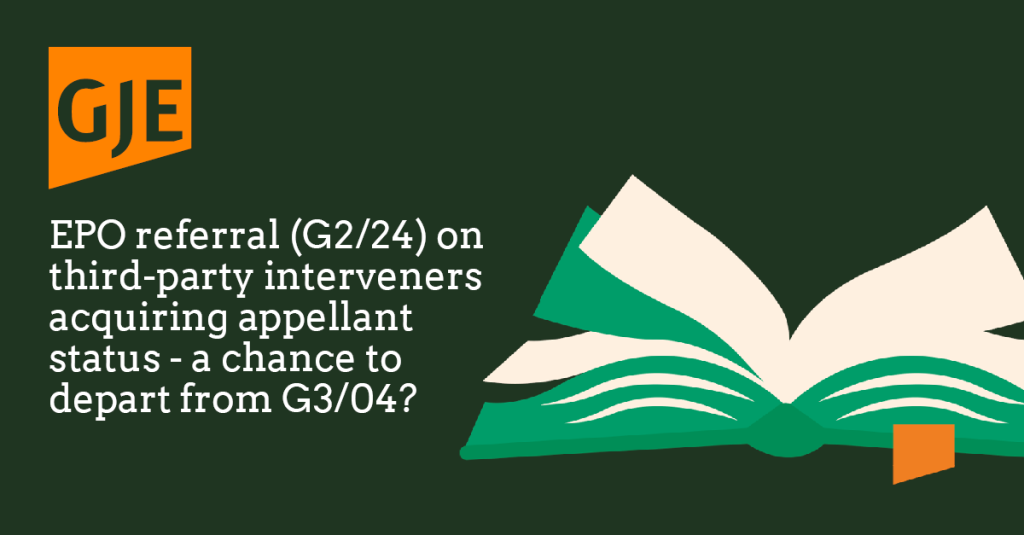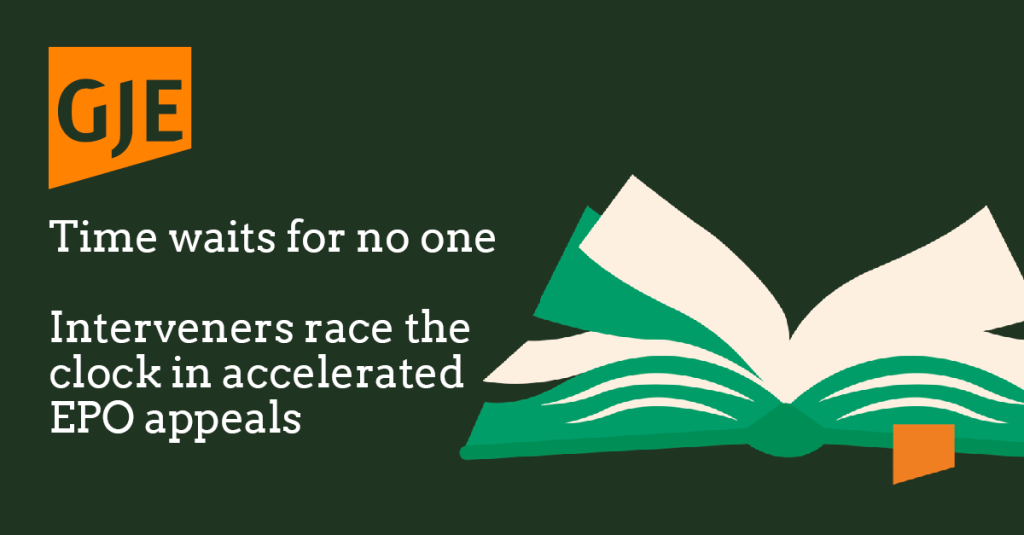
In a significant decision issued on 25 September 2025, the European Patent Office’s Enlarged Board of Appeal has answered the fundamental question posed in G 2/24: third parties that intervene during appeal proceedings cannot continue those proceedings after all appeals are withdrawn, nor can they acquire appellant status. This outcome reaffirms the principles established in G 3/04 rather than departing from them, as the referring Board had hoped.
The verdict on the referred questions
The Enlarged Board provided clear answers to the questions referred by the Technical Board of Appeal in T 1286/23:
“After withdrawal of all appeals, appeal proceedings may not be continued with a third party who intervened during the appeal proceedings in accordance with Article 105 EPC. The intervening third party does not acquire an appellant status corresponding to the status of a person entitled to appeal within the meaning of Article 107, first sentence, EPC.”
This decision maintains the status quo established in G 3/04, confirming that interveners at the appeal stage remain parties as of right under Article 107, second sentence, EPC, rather than acquiring independent appellant status.
Legal reasoning: why G 3/04 stands
The Enlarged Board’s decision addresses why the existing framework remains appropriate. Key findings include:
No substantive legal changes since G 3/04
The Board found that Articles 99(1), 105, and 107 EPC have not been substantively amended since 2005. While some editorial improvements were made with EPC 2000, these did not alter the fundamental legal framework governing interventions and appeals.
The principle of party disposition
The judicial nature of appeal proceedings and the principle of party disposition were central to the decision. The Board emphasised that appeal proceedings are not mere continuations of opposition proceedings but are judicial proceedings governed by specific principles. The scope of these proceedings is determined by the appellants’ requests, and when all appeals are withdrawn, the legal basis for continuing proceedings ceases to exist.
Intervention remains accessory to appeal
The Board confirmed that intervention at the appeal stage is “procedurally an accessory to the appeal proceedings.” Without an explicit legal provision granting interveners independent status, which would require amending the EPC or Implementing Regulations, they cannot continue proceedings independently.
Comparative analysis reinforces the decision
The Enlarged Board conducted an extensive review of intervention practices across EPC contracting states and the UPC. The analysis revealed that in most jurisdictions, interventions are considered accessory to the main proceedings and cease when those proceedings are terminated by the main parties, unless specific statutory provisions state otherwise.
Practical implications for interveners
When we reported the referral in January, we outlined several potential implications if the Enlarged Board had chosen to depart from G 3/04. With this decision maintaining the established framework, the practical reality for interveners is now clear:
- Continuation of proceedings: Interveners at the appeal stage cannot continue proceedings after withdrawal of all appeals—maintaining the G 3/04 position.
- Scope for interveners: While interveners retain broader rights to present new grounds for opposition (per G 1/94), this does not extend to independent control over the proceedings.
- Strategic considerations: The timing of interventions remains critical. Parties threatened with infringement must carefully consider whether to intervene during first-instance proceedings (where they could potentially file their own appeal) versus at the appeal stage (where they remain dependent on existing appellants).
- Settlement dynamics: Patentees can still effectively terminate appeal proceedings through settlements with all appellants, without needing separate agreements with interveners who joined at the appeal stage.
Connection to accelerated proceedings
The timing of this decision is particularly significant given the recent T 1841/23 decision we discussed previously. While T 1841/23 established that late interventions do not automatically justify postponements in accelerated proceedings, G 2/24 confirms that such interveners also cannot salvage withdrawn appeals. Together, these decisions create a clear framework: the EPO remains committed to procedural efficiency while maintaining strict boundaries on intervener rights.
Looking ahead
The Enlarged Board’s decision provides legal certainty but may disappoint those hoping for expanded third-party rights. The Board acknowledged that implementing the changes suggested by the referring board would require legislative amendment rather than judicial interpretation.
For practitioners, the message is clear: third parties facing potential infringement proceedings must act swiftly to intervene at the opposition stage if they wish to maintain independent control over proceedings. Waiting until the appeal stage creates dependency on the original parties’ continued participation.
The decision also highlights the fundamental difference between EPO appeal proceedings and first-instance opposition proceedings. While Rule 84(2) EPC allows the opposition division to continue proceedings after withdrawal of all oppositions, no such discretion exists at the appeal stage due to the judicial nature of board proceedings.
As patent strategy continues to evolve, particularly with the increasing importance of UPC proceedings running parallel to EPO cases, understanding these procedural boundaries becomes ever more critical for effective patent portfolio management and dispute resolution.
For more information about the implications of this decision, or to discuss your own patent strategy, please contact your usual GJE attorney or email us at gje@gje.com.


